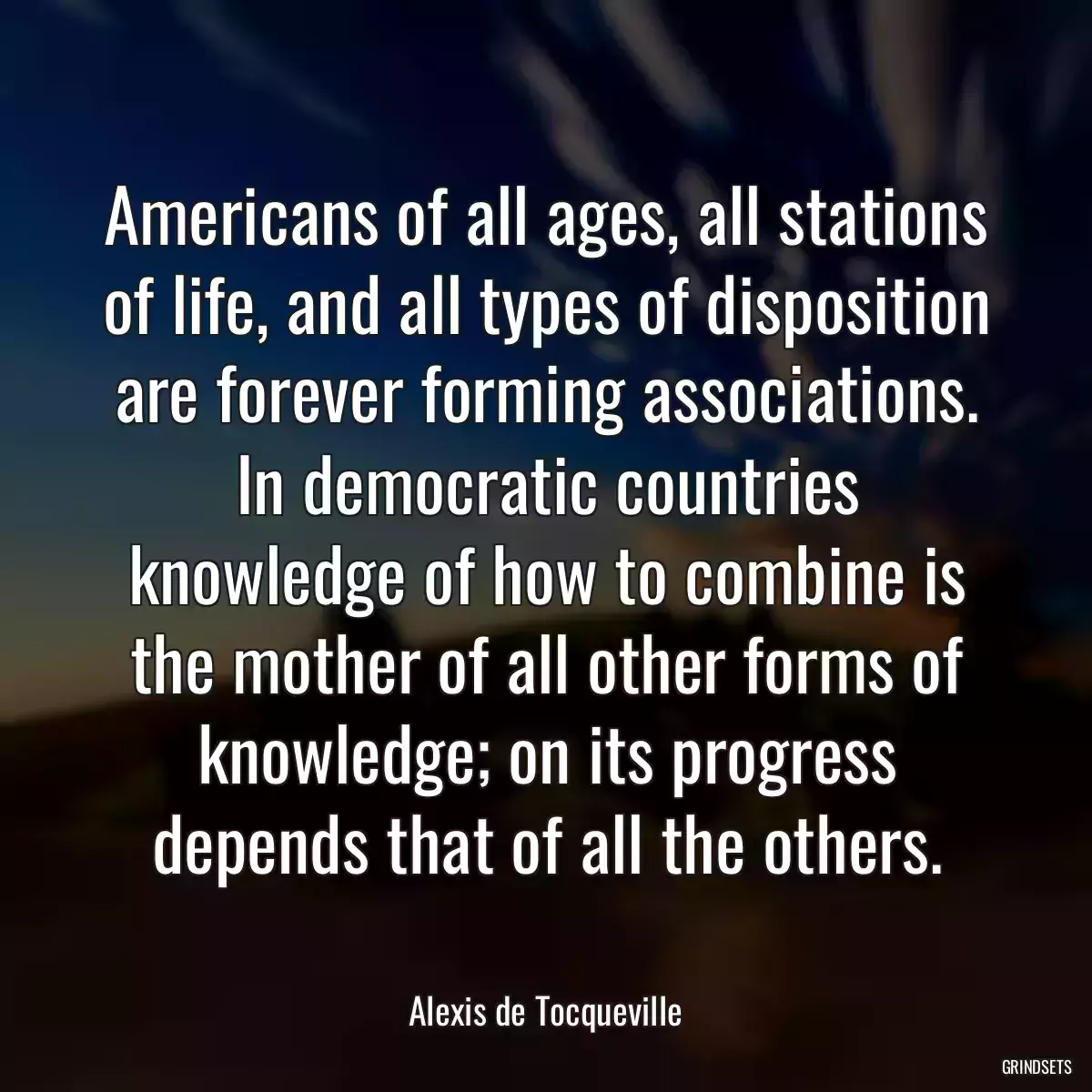
Quotes Alexis de Tocqueville
Find dozens of Alexis de Tocqueville with images to copy and share.

In the United States, if a political character attacks a sect, this may not prevent even the partisans of that very sect, from supporting him; but if he attacks all the sects together, every one abandons him and he remains alone.
The territorial aristocracy of former ages was either bound by law, or thought itself bound by usage, to come to the relief of its serving-men and to relieve their distresses. But the manufacturing aristocracy of our age first impoverishes and debases the men who serve it and then abandons them to be supported by the charity of the public.
The last thing abandoned by a party is its phraseology, because among political parties, as elsewhere, the vulgar make the language, and the vulgar abandon more easily the ideas that have been instilled into it than the words that it has learnt.
You may also like
Men cannot abandon their religious faith without a kind of aberration of intellect and a sort of violent distortion of their true nature; they are invincibly brought back to more pious sentiments. Unbelief is an accident, and faith is the only permanent state of mankind.
Useful undertakings which require sustained attention and vigorous precision in order to succeed often end up by being abandoned, for, in America, as elsewhere, the people move forward by sudden impulses and short-lived efforts.
Step back in time; look closely at the child in the very arms of his mother; see the external world reflected for the first time in the yet unclear mirror of his understanding; study the first examples which strike his eyes; listen to the first words which arouse within him the slumbering power of thought; watch the first struggles which he has to undergo; only then will you comprehend the source of his prejudices, the habits, and the passions which are to rule his life. The entire man, so to speak, comes fully formed in the wrappings of his cradle.
The greatness of America lies not in being more enlightened than any other nation, but rather in her ability to repair her faults.
Despotism may be able to do without religion, but democracy cannot.

I have always thought it rather interesting to follow the involuntary movements of fear in clever people. Fools coarsely display their cowardice in all its nakedness, but the others are able to cover it with a veil so delicate, so daintily woven with small plausible lies, that there is some pleasure to be found in contemplating this ingenious work of the human intelligence.
Muhammad brought down from heaven and put into the Koran not religious doctrines only, but political maxims, criminal and civil laws, and scientific theories. The Gospels on the other hand, deal only with the general relations between man and God and between man and man. Beyond that, they teach nothing and do not oblige people to believe anything. That alone, among a thousand reasons, is enough to show that Islam will not be able to hold its power long in ages of enlightenment and democracy, while Christianity is destined to reign in such ages, as in all others.
A French observer is surprised to hear how often an English or an American lawyer quotes the opinions of others, and how little he alludes to his own; ... This abnegation of his own opinion, and this implicit deference to the opinion of his forefathers, which are common to the English and American lawyer, this servitude of thought which he is obliged to profess, necessarily give him more timid habits and more conservative inclinations in England and America than in France.
I am obliged to confess that I do not regard the abolition of slavery as a means of warding off the struggle of the two races in the Southern states. The Negroes may long remain slaves without complaining; but if they are once raised to the level of freemen, they will soon revolt at being deprived of almost all their civil rights; and as they cannot become the equals of the whites, they will speedily show themselves as enemies.
In the absence of government each man learns to think, to act for himself, without counting on the support of an outside force which, however vigilant one supposes it to be, can never answer all social needs. Man, thus accustomed to seek his well-being only through his own efforts, raises himself in his own opinion as he does in the opinion of others; his soul becomes larger and stronger at the same time.
One of the happiest consequences of the absence of government...is the development of individual strength that inevitably follows.
Rulers who destroy men's freedom commonly begin by trying to retain its forms. ... They cherish the illusion that they can combine the prerogatives of absolute power with the moral authority that comes from popular assent.
If it be admitted that a man, possessing absolute power, may misuse that power by wronging his adversaries, why should a majority not be liable to the same reproach? Men are not apt to change their character by agglomeration; nor does their patience in the presence of obstacles increase with the consciousness of their strength. And for these reasons I can never willingly invest any number of my fellow creatures with that unlimited authority which I should refuse to any one of them.
It profits me but little, after all, that a vigilant authority always protects the tranquility of my pleasures and constantly averts all dangers from my path, without my care or concern, if this same authority is the absolute master of my liberty and my life.
You may also like

What good does it do me, after all, if an ever-watchful authority keeps an eye out to ensure that my pleasures will be tranquil and races ahead of me to ward off all danger, sparing me the need even to think about such things, if that authority, even as it removes the smallest thorns from my path, is also absolute master of my liberty and my life; if it monopolizes vitality and existence to such a degree that when it languishes, everything around it must also languish; when it sleeps, everything must also sleep; and when it dies, everything must also perish?
We can state with conviction, therefore, that a man's support for absolute government is in direct proportion to the contempt he feels for his country.